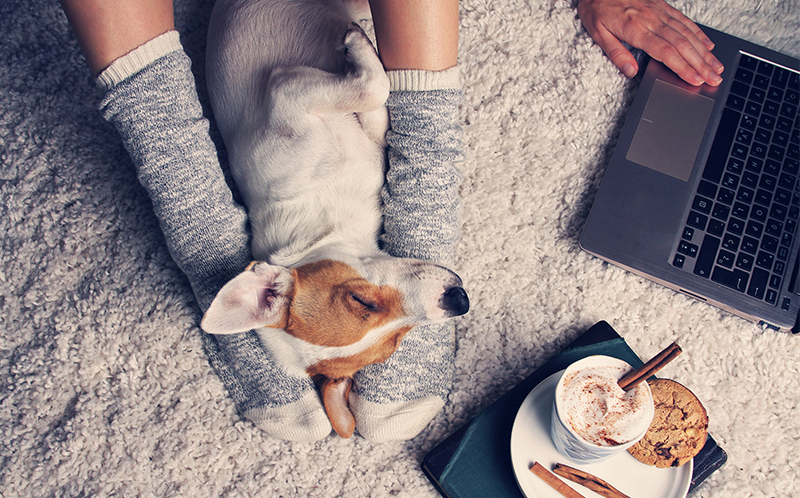
Winter weather can create extra challenges for homeowners, between shoring up vulnerable areas against wind and rain, and winterizing structures against freezing cold. But wintertime can pose serious risks for your pets, too, so follow these tips to help keep your home a safe and comfortable place for your pet in winter weather.
1. Keep them inside your home. Domestic pets don’t have inherent traits that protect them from extreme conditions any more than you do so if it’s too nasty for you to be outside, it’s too nasty for your pet. Keep domestic pets inside and make sure outdoor livestock has adequate shelter, dry bedding, and blankets, if necessary, to protect them from cold, wind, rain, ice and snow.
2. Hydration is key. Dehydration isn’t just a problem in hot weather. If your pet relies on an outside water source, make sure you have a way to keep it from freezing. Pets cannot get sufficient water from eating snow.
3. Gear up for outdoor activity. Whether strolling your neighborhood or taking in local outdoor amenities and attractions, if your pet enjoys time with you outdoors, make sure they’re equipped for the conditions. To keep them warm and dry, a rain slicker, coat, or sweater serve as more than just cute accessories, and weatherproof booties keep paws dry and provide extra traction on frozen ground. Make sure you don’t stay out longer than is safe for your pet, and monitor activity and behavior to make sure they don’t become hypothermic.
4. Check underneath. Ice loves to cling to hair and fur. Keep your pet’s paw hair neatly trimmed, and if your pet has been outside, clean off and dry wet bellies and inspect paws and tail for ice balls.
5. Beware of toxic chemicals around your neighborhood. Where there’s ice, there’s antifreeze. This is highly poisonous to pets and the neon green puddles can be tempting for pets to try to drink from when all other water is frozen. Likewise, de-icers such as salt and other chemicals can be harmful to pets who walk on ground that has been “de-iced” and later lick their paws, ingesting the toxins. If your pet has been exposed to de-icers, make sure to rinse paws in warm water and thoroughly dry.
6. Chase pets from dangerous “hiding places” around your home. Cats and other small animals frequently look for warm places to burrow, such as next to the warm engine of a parked car. Before you start your car, knock on the hood or honk the horn a few times to scare away stowaways – you will be saving their life.
7. Pets’ joints hurt in cold temps, too. Like some of us, older pets can experience arthritis flare ups and increased discomfort during cold weather. A trip to the vet for a check of your senior pet prior to the onset of winter can ensure your pet’s health and medications are on track. Remember to handle sore older pets extra careful, and diligently keep up medications during cold snaps.
8. Be prepared for emergencies. Have you just relocated to a new area? One of the most important parts of settling into your new home is preparing for emergencies, and this includes prepping for your pet’s care. In the event you need to evacuate your home, make sure you have pet necessities packed and ready: food, water, litter, medication, towels, blankets, and a favorite toy or other comforting item for your pet. A recent photo of your pet is also a good idea in case you get separated. Many times, pets are not allowed with their owners at evacuation shelters so have a plan for this ahead of time too. Research local pet friendly hotels, or make arrangements to stay with a friend or family member who lives in a safe area.
9. ID is a must. Above all, keep a collar and tag on your pet with your current phone number. If your pet gets lost, the first place the finder will look is on your pet’s collar. Additionally, your pet should be micro-chipped and registered with your current info. Check your microchip registry and update your information anytime you move or get a new phone number.
This post was written for Realty Executives by Estelle Weber, a freelance writer living in Los Angeles. You can read more of her work here.
